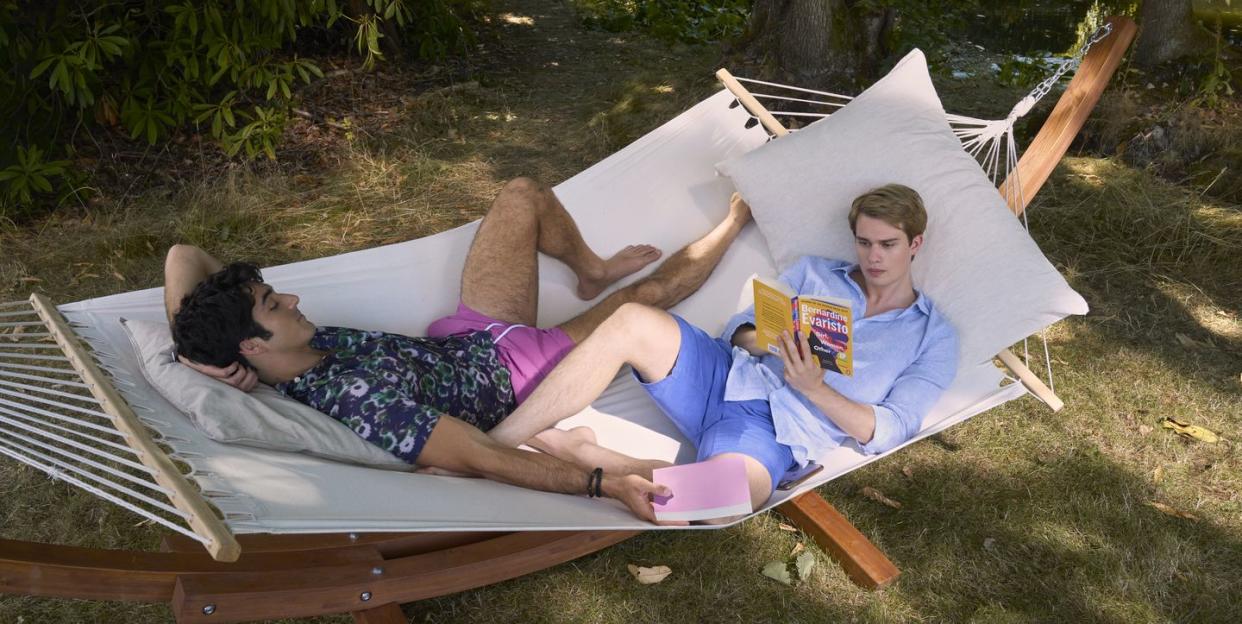All the Biggest Differences between the ‘Red, White, & Royal Blue’ Book and Movie

So far, a lot of the praise for Red, White & Royal Blue, the Amazon Studios original romantic comedy directed by Matthew Lopez and adapted from Casey McQuiston's book of the same name, has focused on how perfectly cast the two leads are. It's true: Taylor Zakhar Perez and Nicholas Galitzine feel like they leapt off the page as Alex Claremont-Diaz and HRH Prince Henry of Wales. But how different is the movie from the book? Let's get ready to nitpick! Lovingly, of course.
In general, the movie speeds through the plot of the book. Most of the iconic moments are there. It follows the same general structure. There aren't any huge changes that make the characters unrecognizable. It just feels like a whirlwind compared to the slower burn of the book. That's to be expected from any book adaptation that's not a miniseries, IMHO. On one hand, it's kind of exhilarating–like you're falling in love alongside Alex and Henry. But it does mean that a lot got left on the proverbial (or possibly literal) cutting room floor.
These characters from the book are MIA:
June Claremont-Diaz, Alex's journalist sister
Rafael Luna, a gay senator and Alex's mentor
Liam, Alex's friend from high school
Queen Mary, Henry's grandmother
Alex doesn't have a ton of friends in the book or the movie, but he still has more people to talk to in the book. (We'll get to that new character in a bit.) Henry's posse of friends and family, on the other hand, is relatively unchanged with one exception. Instead of a grandmother calling the shots he has a grandfather: King James III, played by Stephen Fry.
These storylines were also missing:
The Senator Richards scandal is not in the movie. Well, two scandals: the sexual harassment scandal and the emails scandal. Richards is still present as Alex's mom's political opponent, but just in the background. That makes the plot a little more streamlined but does mean that Ellen Claremont's path to reelection doesn't get any gifts.
Nora is there but doesn't talk like a calculator (affectionate). There's also no indication that she's Alex's ex-girlfriend or queer in the movie like she is in the book. Princess Beatrice's past and drug addiction is not mentioned in the movie. It is a little bit like the director/screenwriters took a red pen to everything interesting about the female characters in the book and crossed them out, muttering "nope," "don't need it," and "boooooring." That's okay! The story is not about them. I recognize that. But don't think I didn't notice. I'm thankful that people can always look to the book to find their other two dimensions.
Oh, and NBD but Alex's parents are not divorced in the movie and he's already in law school. And I hope that, since the Cornetto scene from the book isn't in the movie but is on the official IG for the character, we'll eventually see it as a deleted scene.
Alex's bisexual awakening is much smoother.
Conflict free, even. In the movie, Alex is pretty quick to accept that he's "into guys," as he puts it. He's had two hook-ups with male partners in the past and even if he had identified as straight before, he just kind of happily shrugs his way into bisexuality. In the book, however, he's a little more surprised by his attraction to Henry and growing romantic feelings. It's not that he's harboring internalized homophobia or biphobia. He's just bewildered and has to unpack some "latent bisexual tendencies," as Nora puts it.
I'm more or less fine with this change. In the long run, it's probably best to have more characters in mainstream romantic comedies who don't struggle with coming out. We've had enough movies like that, right? He doesn't need to pull a Nick Nelson and start Googling. Alex is an adult. However, I really liked the way Book Alex re-evaluated his relationship with Liam, a possibly more-than-friend from his childhood, and reconnected with him while he was figuring stuff out and flipping back through past experiences. Growing up and recognizing that certain old friendships had queer aspects you may not have identified at the time is a pretty common experience, and it would have been nice to see that dramatized. That's all!
A new conflict leads to The Leaked Emails Incident.
In the book, Alex and Henry's intimate correspondence gets leaked thanks to the Richards campaign. But in the movie, it's a vindictive political journalist named Miguel who made out with Alex on the campaign, is eventually rejected, and takes out his revenge on the First Son by spilling the beans. As a journalist, I'm offen–just kidding, I don't care. I love mess! I'm also fine with Miguel being the antagonist instead of Richards, too, because "closeted gay Republican sexual predator" is another trope that's had its time. If the also tired "reporter who tries to sleep with their sources" trope is the trade, so be it.
Finally, did you catch these Easter Eggs??
There are some nods to the books that have nothing to do with the plot. First, Alex reads McQuiston's time travel romance One Last Stop while on vacation. Then, the author themself shows up in the flesh towards the end of the movie. McQuiston plays a speechwriter, furiously typing up POTUS' potential concession and acceptance speeches on Election Night. Very cute, just like this adaptation of RW&RB, changes and all.
You Might Also Like


